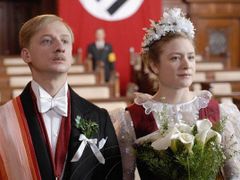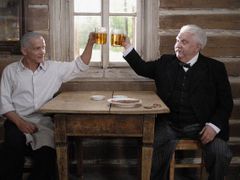Prague/Los Angeles - The combination of a master story teller Bohumil Hrabal and his dedicated film interpreter Jiří Menzel proved to have an international appeal when the latter's film Closely Watched Trains, based on the former's novel, won the prestigious Oscar for the best foreign language film from the American Academy of the Motion Picture Arts and Sciences 40 years ago.
Now everybody wonders if they can do it again. Bohumil Hrabal is no longer alive but his books continue to speak to many people and Menzel had to wait for years before he was finally able to secure the rights to realize his long-held ambition and put Hrabal's I Served the King of England on the silver screen.
The film tells a story of a waiter who finds himself swept by the tides of history in the pre-war (democratic), war-time (Nazi-occupied) and post-war (communist) Czechoslovakia.
The recipe is right
The annual Academy Awards ceremony is to be held in four months' time on February 24, 2008, and it will be for the 80th time.
The coveted trophy can bring not only millions of dollars through the box office of American movie theaters but also an instant global fame and better distribution chances across the world. No less than 63 movies from as many countries will be competing for that privilege next year.
And what is said to make the way to the Oscar easier? In the foreign language category, insiders claim, it is a decent, good looking story that should be based on real occurrences, ideally touching on the country's most significant moments of history.
A list of Czech and Czechoslovakian Oscar winners seems to uphold this theory The Shop on the Main Street (Oscar in 1965), Jiří Menzel's own Closely Watched Trains (1967) as well as Kolya (1996) all tell about the most dramatic moments of the country's recent past.
The new Menzel's epic follows the ups and downs of Czech history as well, though many Czech film critics find its view too nostalgic.
Menzel firmly on the ground
The fact that he already has one Oscar to his name might actually improve Menzel's chances of winning another one as his name is not unknown to the Film Academy. However, the filmmaker himself says he is not holding his breath:
"I was happy that the film got nominated because these were my colleagues from the Czech film academy who selected it. And they know a lot about film," the movie director told Aktuálně.cz a month ago adding that he was surprised by the nomination but still skeptical towards the eventual outcome in Los Angeles.
"We live in a different world today and I am not sure if the film is compatible with the American taste," said Jiří Menzel.
His film was met with mixed feelings among the Czech critics as well as public and fared much better in the international arena, taking the prestigious international critics award FIPRESCI at last February's Berlinale.
A pack of veteran wolves
To claim the coveted golden statuette in Los Angeles next year, Menzel will have to stave off a tough competition.
Many of his fellow film veterans are in the game including 98-year-old Portuguese director Manoel de Oliveira who was nominated for his latest film Belle Toujours. He is considered the oldest still active director of today's movie world.
Poland is also sending an international heavyweight to the Oscar battle in the person of 81-year-old Andrzej Wajda who will be represented by his recently released film Katyn about a World War II massacre. Wajda received an honorary Oscar award in 2000.
And the list goes on. Other filmmakers with an Oscar notch on their belt who are vying for the prize are Italian Giuseppe Tornatore (1990 Oscar for Cinema Paradiso) who will introduce his new film The Unknown and Canadian Denys Arcand (2004 Oscar for The Invasion of the Barbarians) who will try his luck with The Age of Ignorance.
And the Russian legend Nikita Mikhalkov, who won in 1994 with his epic Burnt by the Sun, cooked precisely by the Oscar recipe book, will be offering his film 12, a remake of the famous Twelve Angry Men which Mikhalkov reset in the Chechnya conflict.










